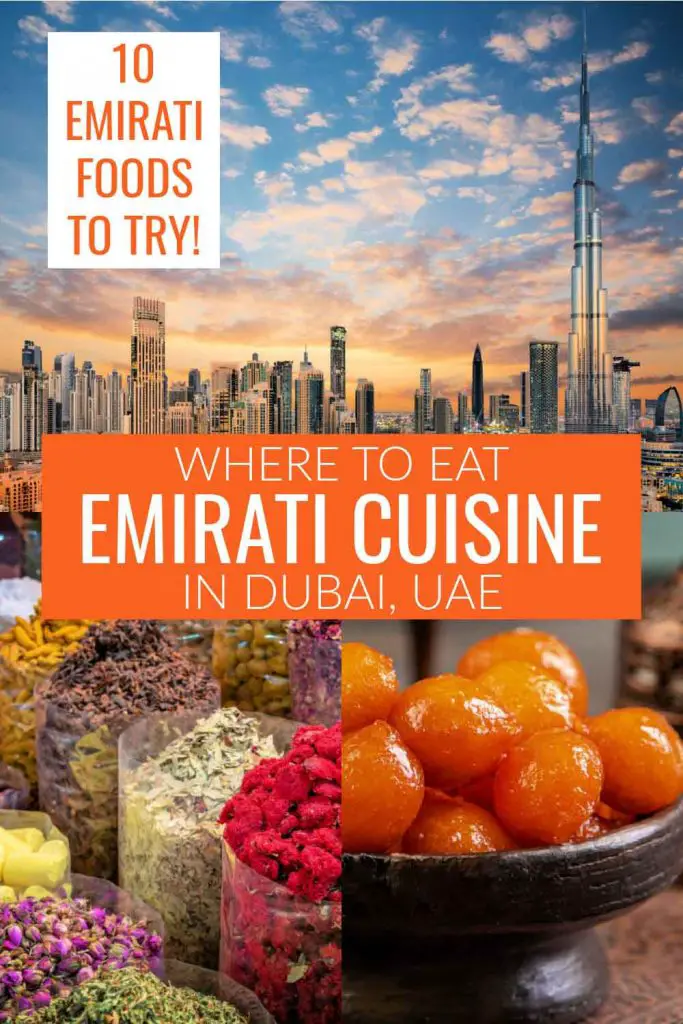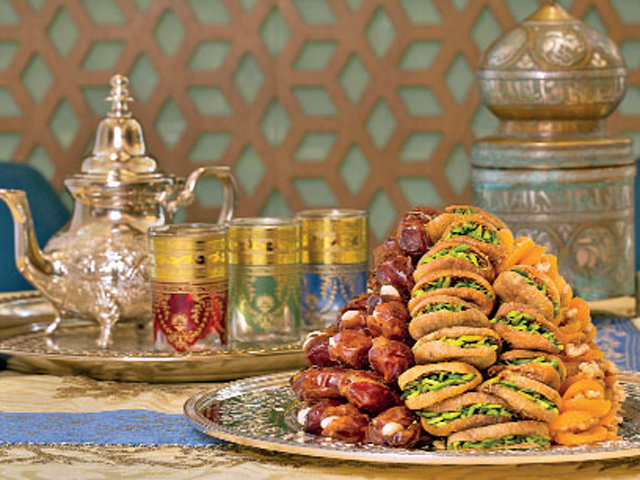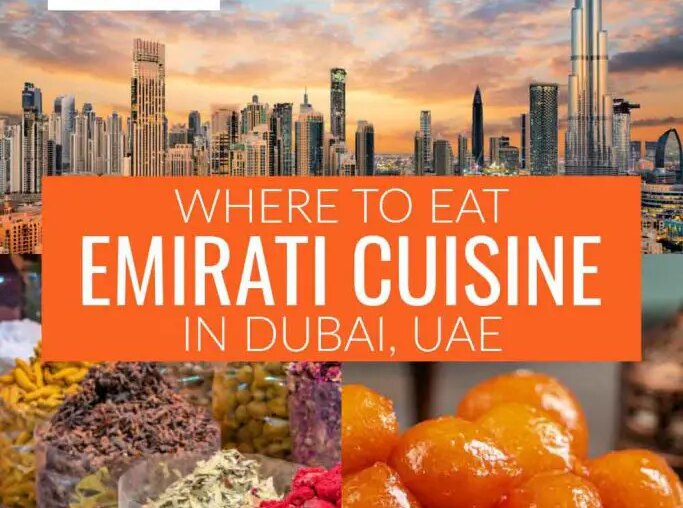
A Culinary Journey Through Dubai: Delving into Emirati Cuisine
Dubai, a vibrant metropolis known for its towering skyscrapers, luxurious shopping malls, and bustling markets, also holds a rich culinary heritage. Beyond the international culinary scene, lies the heart of Emirati cuisine, waiting to be discovered. It’s a journey through time, flavors, and traditions, offering a glimpse into the soul of the Emirati people.
A Tapestry of Influences:
Emirati cuisine is a fascinating blend of influences, reflecting the country’s historical interactions with various cultures. The foundation lies in traditional Bedouin cooking, with a focus on simplicity, using readily available ingredients like dates, fish, and spices. The arrival of trade routes brought in elements from Persia, India, and Africa, enriching the culinary tapestry with new techniques and flavors.
A Feast for the Senses:
Emirati dishes are renowned for their aromatic spices, vibrant colors, and generous portions. Rice, a staple food, is often served with a variety of stews, curries, and grilled meats. Lamb and chicken are popular choices, marinated in fragrant spices and grilled to perfection.
Essential Dishes to Try:
1. Machboos: A fragrant rice dish, often prepared with lamb, chicken, or fish, seasoned with turmeric, saffron, cardamom, and cumin. The aromatic rice is cooked in a flavorful broth, creating a truly comforting meal.
2. Harees: This hearty dish is a slow-cooked blend of wheat, meat (usually lamb or chicken), and spices. Traditionally, it is prepared in a large pot over a slow fire, allowing the flavors to meld together.
3. Luqaimat: These sweet, deep-fried dough balls are a popular Emirati dessert. They are often served drizzled with date syrup and sprinkled with sesame seeds, offering a delightful blend of sweet and savory.
4. Balaleet: A sweet and savory dish that combines vermicelli noodles with a rich, creamy egg sauce. The dish is often garnished with chopped nuts and raisins, offering a satisfying blend of textures and flavors.
5. Madrooba: A comforting dish of mashed bananas, served with a rich, creamy sauce made with milk, sugar, and cardamom. The banana’s sweetness is perfectly balanced by the aromatic spices in the sauce.
6. Camel Meat: While not as common as other meats, camel meat is a traditional delicacy in Emirati cuisine. It is often served in stews, grilled, or roasted, offering a unique and slightly gamey flavor.
7. Fish: Fresh seafood is a staple in coastal Emirati cuisine. From grilled fish to fish stews, the bounty of the sea is celebrated in various dishes.
8. Dates: A quintessential element of Emirati cuisine, dates are enjoyed in various forms, from fresh to dried, and are often incorporated into sweet and savory dishes.
Where to Find Emirati Delights:
1. Traditional Restaurants: Many traditional Emirati restaurants offer a wide range of authentic dishes. Look for places with a focus on family-friendly dining and a warm, welcoming ambiance.
2. Local Markets: The bustling souks of Dubai are excellent places to discover Emirati street food and snacks. Look out for local vendors offering freshly made luqaimat, falafel, and other traditional treats.
3. High-End Dining: Even in the most luxurious restaurants, you can find a taste of Emirati cuisine. Many upscale establishments offer innovative interpretations of traditional dishes, showcasing the versatility of Emirati flavors.
Beyond the Food:
Experiencing Emirati cuisine is more than just tasting the food; it’s about immersing yourself in the culture. Visit traditional homes, attend cultural events, and learn about the stories behind the dishes.
Conclusion:
Dubai’s Emirati cuisine is a testament to the country’s rich history and diverse influences. As you explore the vibrant city, take the time to delve into its culinary heart and savor the flavors of tradition. From the aromatic spices to the welcoming hospitality, a journey through Emirati cuisine is an unforgettable experience.
:quality(70)/cloudfront-eu-central-1.images.arcpublishing.com/thenational/KVGI6677CUJL7EJSLIVR7MQFWM.jpg)
Here’s more about the topic discussed above:
A Culinary Journey Through Dubai: Emirati Cuisine Beyond the Glitter
Dubai, a dazzling metropolis of skyscrapers and shopping malls, might seem like a place built for global cuisine. Yet, beneath the shimmering facade lies a rich culinary heritage, waiting to be explored. This is the world of Emirati cuisine, a tapestry of flavors and traditions that tell the story of this region’s history and culture.
While international restaurants dominate the city’s dining scene, a growing movement is highlighting the authenticity and deliciousness of Emirati food. This isn’t just about nostalgia; it’s about rediscovering the unique tastes and traditions that make Dubai truly special.
The Essence of Emirati Cuisine: Simplicity and Freshness
Emirati food is characterized by its simplicity and freshness, reflecting the region’s history as a trading hub. Dishes are typically made with local ingredients like dates, fresh seafood, lamb, and spices, prepared with minimal processing. The result is a cuisine that celebrates the natural flavors of the ingredients.
Must-Try Dishes: A Culinary Adventure
1. Luqaimat: These are light, fluffy, and melt-in-your-mouth donut-like balls, traditionally made with flour, water, yeast, and cardamom. They are deep-fried to golden perfection and served hot, drizzled with honey and sprinkled with sesame seeds.
2. Machboos: This hearty rice dish is a staple of Emirati cuisine. Basmati rice is cooked with meat (lamb, chicken, or fish), vegetables, and a blend of spices, including saffron, cardamom, and cinnamon. Each bite is a burst of flavor and aroma.
3. Harees: A comforting and nourishing porridge made from coarsely ground wheat, meat, and spices. It’s slow-cooked for hours, creating a creamy and flavorful dish that’s perfect for a cold night.
4. Tharid: A traditional Bedouin dish made with layers of flatbread soaked in a flavorful broth, traditionally lamb and vegetable. It’s a hearty and satisfying dish that reflects the nomadic lifestyle of the region.
5. Ghuzi: A celebratory dish consisting of whole lamb or goat slow-roasted with rice and spices. The meat is incredibly tender, infused with the rich aromas of the spices, making it a truly indulgent experience.
6. Balaleet: Sweet vermicelli noodles tossed with a creamy egg sauce and topped with saffron and sugar. The sweet and savory flavors make it a unique and delightful treat.
7. Aseeda: A simple but satisfying porridge made from coarsely ground barley. It’s typically served with butter and sugar or dates, and can be enjoyed for breakfast or as a light snack.
Where to Experience the Authentic Flavors
1. Al Mallah Restaurant, Jumeirah: Nestled in the heart of Jumeirah, Al Mallah offers a beautiful ambiance and serves traditional Emirati dishes with a modern twist. Their Machboos and Ghuzi are particularly noteworthy.
2. The Dubai Creek: Explore the historic district of Deira along the Dubai Creek for authentic Emirati eateries. Look for family-run restaurants that specialize in traditional dishes like Harees and Tharid.
3. The Old Souk: The souks of Dubai offer a glimpse into the city’s cultural heritage. Stop by one of the many cafes and teahouses for a taste of traditional Emirati snacks like Luqaimat and dates.
4. The Al Fahidi Historical Neighborhood: Immerse yourself in the history and culture of Dubai in the Al Fahidi neighborhood. Several cafes and restaurants here offer authentic Emirati cuisine, showcasing the region’s culinary traditions.
5. The Sheikh Mohammed Centre for Cultural Understanding (SMCCU): Beyond dining, the SMCCU offers cultural experiences like traditional Emirati meals prepared by local chefs. It’s a chance to learn about the history and traditions behind the cuisine.
Beyond the Plate: Experiencing Emirati Cuisine
Emirati cuisine is more than just food; it’s a cultural experience. Immerse yourself in the local way of life by:
- Visiting a local market: Witness the vibrant energy of a traditional market and interact with vendors who share their knowledge of local ingredients and recipes.
- Attending a cultural event: Participate in a traditional Emirati gathering, such as a wedding or a celebration, to experience the cuisine in its cultural context.
- Learning to cook Emirati dishes: Enroll in a cooking class and learn the secrets of traditional recipes from local chefs.
Conclusion:
The culinary journey through Dubai’s Emirati cuisine is an exploration of tradition, culture, and flavor. It’s about discovering a side of Dubai beyond the glittering facade, embracing the authentic tastes and stories that make this city unique. So, next time you’re in Dubai, go beyond the global fare and delve into the heart of Emirati cuisine; it’s a delicious adventure waiting to be explored.


